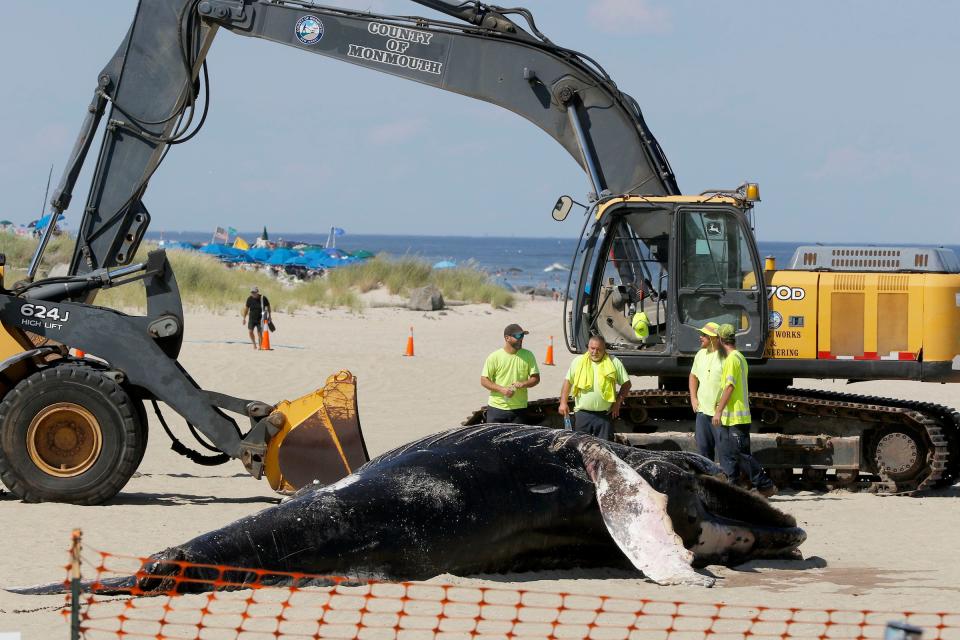Trenton pols ignore brutal facts, residents' concerns in critical NJ offshore wind debate
The winds, they are changing; however, there is a foul stench in the air, and it leads directly to the halls of the New Jersey Statehouse. The stench stems from the ever-growing number of dead bodies of whales and dolphins that had their lives cut short due to the irresponsible actions of the members of the Legislature who sold out our coastlines, oceans, beaches and more for the promise of foreign “green” energy dollars associated with wind turbine projects.
Yet this unfortunate tale of greed truly began in 2021. You see, while most of us were consumed with all the goings-on surrounding COVID-19, New Jersey state senators and Assembly members passed a law along party lines revoking local authorities' say when it comes to wind turbine projects off the Jersey Shore. Essentially, our “leaders” in Trenton knowingly and wrongfully sought to silence the voices of towns and their residents before projects even commenced — a dark foreshadowing of what carnage was to come.
Fast-forward to when wind companies began deploying acoustic sonar mapping ships. These ships use a type of sound to map the seafloor to gauge the sediment of the oceans before hammering monopole structures for wind turbines. The correlation between when these acoustic mapping ships started operations and when the first deceased marine mammals were found is, some may say, more than coincidental.
More perspective: Offshore wind isn’t a partisan issue. This is how real NJ people will be affected
How is there a possible connection? Well, marine mammals such as whales, dolphins, orcas and porpoises are echolocation-based ocean animals. That means they rely heavily on their ears to judge depth, hunt and communicate. Unlike other marine animals, echolocation-based mammals’ survival is grounded in their natural sonar capabilities. Any disruption to their natural sonar by man-made sonar can be devastating.

To illustrate further, the sounds from sonar mapping ships can drive into marine mammals’ ears, causing eruptions and severe, debilitating injuries. To draw a comparison, imagine attending a heavy metal concert where you stood near a 7-foot speaker for hours on end. The damage caused to your eardrums would be debilitating, wreaking havoc on your equilibrium. Now assume you are a whale or dolphin that is having the same happen to them each day. I’ll let you make your own conclusions.
A common rebuttal to this possibility, popular among state politicians who voted in favor of “big wind,” is that these animals show no significant damage to their sonar-based ears and that the cause of death is likely from boat strikes. They would have you believe that these animals, which have lived for centuries alongside commercial shipping lanes, are now just happening to find themselves swimming into the propellers of massive cargo ships.
Sounds ridiculous, no? That’s because it is false and a means for them to suppress the nature of their voting records, since they know how bad this has become. They are the ones spreading “misinformation,” not those who object to wind turbines, and here is why.
One of the first body parts of whales and dolphins that deteriorate postmortem is their ears. This was stated to me directly by officials of the National Oceanic and Atmospheric Administration. If that is the case, how can they justify saying there is no evidence? Also, in the partial inner ears that have not completely disintegrated, some of these animals have shown damage.
As far as boat strikes: If you have ever had the misfortune of having an ear infection or eardrum damage, you know all too well how your equilibrium is disturbed. You become uncontrollably unbalanced, lose focus and can be disoriented.
Now imagine the same devastating impact on an aquatic animal, whose survival rests on the proper functioning of their ears and equilibriums to survive. Becoming permanently or even partially disoriented can have devastating effects, possibly including causing them to swim too close to ships.
In the end, no matter what you believe is happening, a lot of this combativeness could be avoided if New Jersey legislators in Trenton stopped acting so egregiously and without care for those they represent. This is not the first time they have acted in total disregard for the towns and people they took an oath to safeguard.
It is a constant: passing budgets in the middle of the night or waiting until July Fourth weekend to give big wind a billion-dollar tax incentive. The Trenton pols tell residents that they believe “misinformation,” and they show utter disregard for us when the public dares to challenge their decisions.
But really, we as New Jersey residents must do a better job of calling into question motives, votes and actions by these “leaders.” If we do not start to pay more attention to what is going on, then things will only continue to get worse.
Brian J. Thomas is council president of the borough of Neptune City.
This article originally appeared on Asbury Park Press: Jersey Shore wind: While whales die, Trenton pols ignore public

